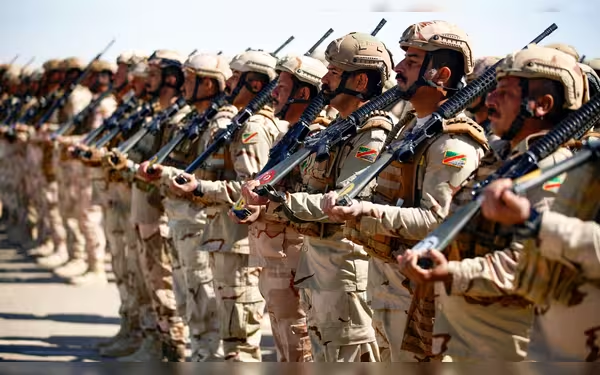Saturday, November 16, 2024 07:43 PM
Iraqi Forces Eliminate Senior Daesh Commander in Joint Operation with US
- Iraqi and US forces kill Daesh commander Abu Ali Al-Tunisi.
- Operation leads to confiscation of weapons and explosive belts.
- Sleeper cell attacks continue to pose a threat in Iraq.
 Image Credits: arabnewspk
Image Credits: arabnewspkIraqi and US forces eliminate Daesh commander Abu Ali Al-Tunisi in Anbar, highlighting ongoing security challenges from sleeper cells.
BAGHDAD: In a significant development in the ongoing fight against terrorism, Iraqi forces, in collaboration with American troops, have successfully eliminated a senior commander of the Daesh group, along with several other militants. This operation, which took place in Iraq's western Anbar province, marks a crucial step in the efforts to dismantle the remnants of Daesh, a group that once controlled vast territories in Iraq and Syria.
The operation commenced in late August and involved not only the Iraqi military but also the Iraqi National Intelligence Service and the air force. Among those killed was Abu Ali Al-Tunisi, a Daesh commander from Tunisia, who was on the United States' radar with a $5 million bounty on his head. Ahmad Hamed Zwein, the deputy commander of Daesh in Iraq, was also among the casualties.
Despite the defeat of Daesh in Iraq in 2017, the threat from sleeper cells has not diminished. Over the past few years, there has been a noticeable increase in attacks attributed to these sleeper cells, resulting in numerous casualties. This highlights the ongoing challenges faced by Iraqi and coalition forces in maintaining security and stability in the region.
Interestingly, this announcement was not the first indication of the operation's success. Just two weeks prior, officials reported a joint raid by U.S. and Iraqi forces in the western desert, which resulted in the deaths of at least 15 individuals and injuries to seven American troops. The details surrounding this raid were initially kept under wraps, with a U.S. defense official providing insights only after the operation had concluded.
In addition to the high-profile kills, the operation also led to the confiscation of various weapons, computers, smartphones, and ten explosive belts. The Iraqi military reported that DNA tests helped identify 14 Daesh commanders, although they did not provide information on the 15th individual killed during the operation.
Daesh, which declared a caliphate in 2014, once ruled over an area half the size of the United Kingdom, enforcing a strict interpretation of Islam and committing numerous atrocities against religious minorities and those they deemed apostates. The group lost its last territory in eastern Syria in March 2019, but the rise in sleeper cell attacks serves as a grim reminder that the threat is far from over.
On the same day as the announcement regarding the Anbar operation, the U.S. Central Command reported the killing of a Daesh attack cell member in eastern Syria. This individual was reportedly in the process of planting an improvised explosive device aimed at anti-Daesh coalition forces, underscoring the ongoing risks faced by those combating this extremist group.
As the U.S. military continues to reassess its role in Iraq, with approximately 2,500 troops currently stationed there, the focus remains on transitioning responsibilities to Iraqi forces. The security situation on the ground will play a crucial role in determining the future presence of U.S. troops in the region.
While the recent operations have dealt significant blows to Daesh leadership, the persistent threat from sleeper cells indicates that the fight against terrorism is far from over. It is essential for both Iraqi and coalition forces to remain vigilant and proactive in their efforts to ensure the safety and security of the region. The international community must also continue to support Iraq in its quest for stability, as the repercussions of terrorism extend beyond borders, affecting global peace and security.













